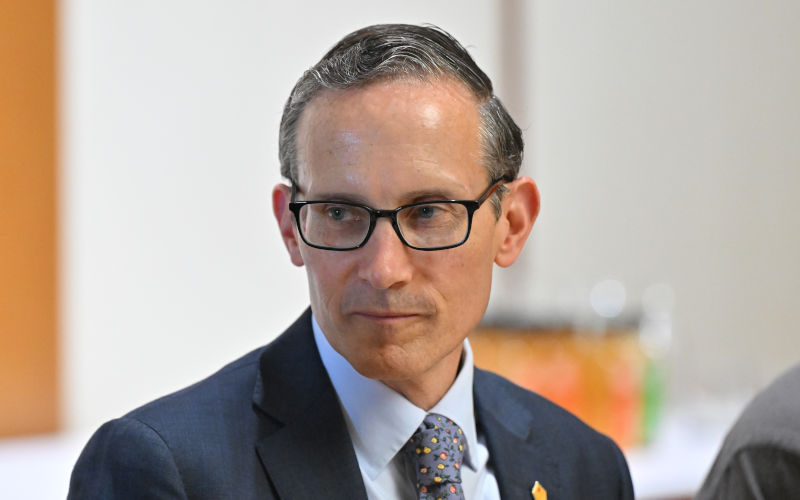Seeking the positive-sum economy where everyone wins a prize
September 30, 2025
What is this “abundance” thing that progressive economists are suddenly banging on about after reading the latest American pop economics book? At last, one of them has explained it.
He is Dr Andrew Leigh, Australia’s assistant minister for productivity, competition, charities, treasury and the kitchen sink. In short, he’s the assistant assistant treasurer. Leigh is a former economics professor and one of the brightest minds in the government.
So why does he have such a rag-bag of a job? Because he’s not a member of either Labor’s right and left factions, which means that, no matter how capable he is, he gets what’s left after the faction members have bagged all the top jobs.
This is good, actually, because it leaves Leigh with time to do the government’s creative thinking. He gave a thoughtful speech last week about “the politics of abundance and the perils of zero-sum thinking”. In it, he does a much better job of explaining the relevance of abundance than the authors of the book.
Economics is sometimes defined as the study of scarcity. Our wants are infinite, but the resources available to fulfil those wants are finite, so economists help us maximise the satisfaction we extract from the available resources. But the authors say economists should be on about abundance, not scarcity.
Leigh explains that abundance doesn’t mean everyone gets to be as rich as Gina Rinehart, but that everyone should be provided with the capability to live the life they want. He adds that when the economy is seen as a zero-sum game, ambition shrinks, but when we see the possibility of positive-sum outcomes, we open the way for abundance. Abundance is “the ability of societies to deliver more homes, more affordable energy, more inclusive growth”.
Trouble is, too many of us are inclined to see the economy as a zero-sum game. Zero-sum thinking sees everything as a contest in which if I win, you must lose and vice versa. Positive-sum thinking says if we work together we can all be better off.
Economists often use the metaphor of a pie. If the pie is of fixed size, all you can do is compete for a bigger slice at other people’s expense. But economists say that, if we do it right, we can make the pie grow bigger, so everyone gets a bigger slice.
Unfortunately, zero-sum thinking is the simplest and easiest way to analyse something: you divide it into two possibilities, the good and the bad. Thus, it’s easy to see immigration as a case of migrants versus jobs. Gender debates are seen as women versus men. Climate change is jobs versus the environment.
Leigh says that, when you view politics this way, ambition shrinks and co-operation falters. But, though he doesn’t say so, two-party politics is the epitome of a zero-sum game. An adversarial system of government and opposition, in which only one side can win.
Another point I’d have made is that whether some action is zero-sum or positive-sum often depends on whether you’re thinking short term or longer term. Can action on climate change cost jobs? Yes, of course. Will banning the logging of old-growth forests cost the loggers their jobs? Yes.
But that’s just what economists call “the first-round effect”. And, as someone once said, the most important question economists keep asking is “but then what happens?” . In such cases as these, the displaced workers find jobs elsewhere (with help from the government, you hope), but the damage to the environment stops.
It’s because economists know to distinguish between initial effects and ultimate effects that they find it easier to see the likelihood of positive-sum ultimate outcomes.
Leigh says zero-sum thinking is common, but not inevitable. It’s shaped by culture, history and politics. And it carries real consequences. People who think this way are less trusting, more anxious and more convinced that society is unfair.
“Negotiators who assume every gain for the other side is a loss for them miss opportunities for co-operation. Politicians who frame issues in zero-sum terms find it harder to build coalitions. And when populism exploits zero-sum narratives, democracy itself risks becoming a theatre of permanent division,” he says.
What people think is important. “If you believe government is captured by elites, then every policy must be suspect. If you believe institutions can work for the public, then reform is possible,” he says.
People’s experiences of growth and mobility matter enormously. When families see that children are doing better than their parents, life feels like an expanding pie. Progress seems natural. But when growth stalls and mobility falters, scarcity starts to feel like common sense.
“That is why younger generations in many rich countries are more prone to zero-sum beliefs than their parents and grandparents. They have grown up in decades when wages barely moved and housing became less affordable. Their parents could expect each generation to do better. They cannot,” Leigh says.
Abundance is about competence. It’s about building systems that deliver more homes, more energy, more research – systems that replace delay with delivery, and scarcity with capability.
But abundance is also about mindsets. It requires belief – belief that progress is possible, belief that growth can be shared, belief that win-win outcomes exist.
So the politics of abundance has a double task: deliver concrete results through institutions that work and foster the cultural confidence that those results are possible and can be shared.
Republished from The Sydney Morning Herald, 29 September 2025
The views expressed in this article may or may not reflect those of Pearls and Irritations.


